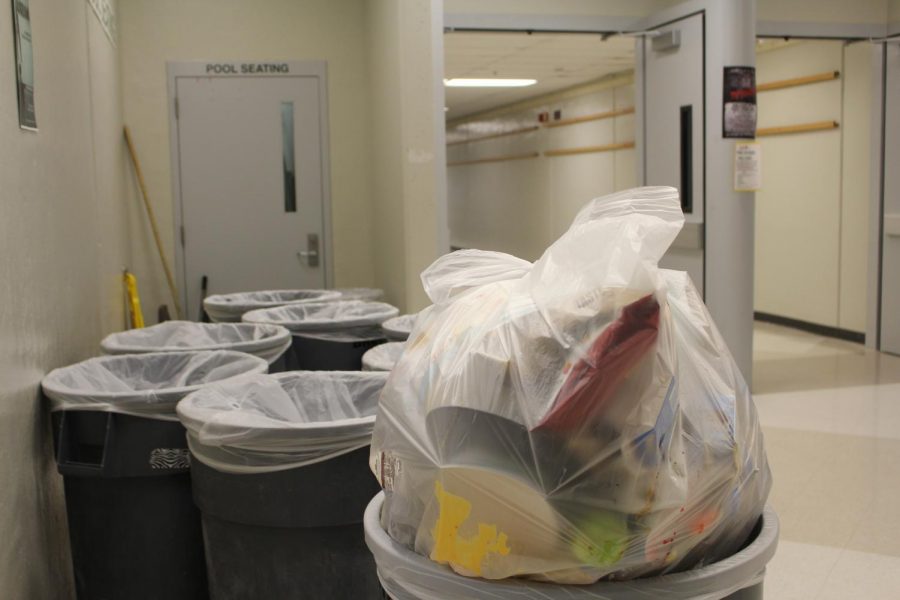The Tragedy of Millard West
Millard Public Schools should consider an environmental education and sustainability program
March 26, 2019
Orange peels, straws and used napkins line the floor as custodians are forced to pick up for students who neglect their waste. This issue is prevalent in the lunchroom, but extends to all corners of the school; in February 2019, Millard West students were banned from eating in the library due to leaving their food behind on tables
Despite its rather melodramatic sound, the economic concept of “the tragedy of the commons” applies to Millard West. Coined by British economist William Forster Lloyd and American ecologist Garrett Hardin, the tragedy of the commons describes when individuals collectively deplete and misuse resources in shared space for their own self-interest.
People tend to neglect the welfare of communal land and resources because they do not feel responsible for it. Although the population’s taxes pay for public education, the government allocates funds and creates restrictions. This can skew peoples’ view of public education facilities and ownership, which further contributes to the issue.
Millard West currently does not have environmental programs in place beside recycling, which is often overlooked by students. More often than not, garbage is thrown in the recycling cans contaminating the materials or completely disregarded at all. The recycling program is conducted by a singular teacher, Alexander Fields, who occasionally gets volunteers to help. Some of these volunteers include students from Millard West Environmental Club.
Although there is no required curriculum in MPS that informs students about environmental impact or sustainability, students have the opportunity to take elective courses like Environmental Science and AP Environmental Science and join EcoWest. Students are obligated to take history classes to learn from past mistakes and prevent the same tragedies from occurring again. The same concept should be applied to environmental curriculum; students need classes pertaining to the environment to negate future damage, learn to solve problems through innovation and take responsibility for their actions.
Some Nebraska schools have taken this initiative by putting a plethora of programs in place. These programs superseded traditional sustainability methods like recycling and take their objective to the next level.
In 2015, Omaha Public Schools adopted the Green Schools Initiative to reduce natural resource consumption and promote environmental responsibility. The program sets goals for paper usage, water consumption, emissions and amount of green engagement teams per school. They have won over 10 Green Ribbon awards from the U.S. Department of Education for reducing environmental impact and costs, improving wellness and offering effective sustainability education.
According to the OPS website “After six years, OPS has seen a positive culture change, has dramatically reduced its environmental impact, and has accumulated approximately $9.8 million in cumulative cost reduction and avoidance and avoided the greenhouse gas emissions 88,165 Mt of CO2 equivalent to the emissions produced by burning 395 railcars of coal.”
Duchesne Academy of the Sacred Heart decided to evaluate how the school could be a better steward of the earth’s resources through developing a sustainability program. They became the first Omaha school to launch a composting campaign in 2017 as well as focus on locally grown foods for lunch programs to eliminate landfill waste. Goals of the sustainability plan including becoming zero waste and building net positive emissions by 2030, a sustainable food system and sustainability curriculum.
Lincoln Public Schools has its own sustainability department which promotes green efforts throughout the district and the community by implementing environmentally responsible practices. Their efforts include education, composting, recycling, school gardens and construction waste diversion.
A waste composition analysis by the Minnesota Pollution Control Agency found “over 78% of school waste could be diverted from the trash to organics composting and container/paper recycling collection programs. The schools had an average per capita total waste generation of just over half a pound per day. By extrapolation, this means Minnesota K-12 public schools generate an estimated 483,520 pounds of waste per day.”
Although some areas could be improved, MPS has made headway in reducing energy consumption. According to the MPS website, “Over the course of the last 8 years, Morrissey Engineering has helped MPS reduce district-wide energy use intensity by 7.8 kBTU/gsf/yr. This is equivalent to nearly 10% of total annual energy consumption and almost $890,000 in energy consumption cost avoidance across the district.”
MPS oversees 35 elementary, middle and high schools that collectively house around 24,000 students; With a large population comes a large amount of trash. MPS needs to create a sustainability program to properly educate the future generation about its impact to reduce waste and consumption.
Landfills around the world get bigger by the day. They serve as a haven for toxins to build up, leaching and greenhouse gases.
Plastic is one of the most dangerous and common components of landfills. Everything we eat, use, and buy is packaged in plastic. Not only does plastic take hundreds of years to decompose, it can release harmful chemicals into the soil and pollute water sources. Plastic does not biodegrade, instead it breaks down into tiny pieces that different forms of sea life consume; this leads to bioaccumulation and is ultimately a threat to public health.
Wasted food is another dangerous component of landfills. According to the United States Environmental Protection Agency “when food goes to the landfill, it’s similar to tying food in a plastic bag. The nutrients in the food never return to the soil. The wasted food rots and produces methane gas.”
An alternative to throwing food spoils in landfills is creating a compost. Some time called gardeners “black gold,” composts help to create nutrient soil with excellent water retention properties. Unfortunately, composting does carry some risks. Composts can become breeding grounds for infections; some common infections include but are not limited to Tetanus, Legionnaires disease and Histoplasmosis. These dangerous pathogens can be prevented by wearing proper protective gear, washing your hands and avoiding storing compost in airtight containers.
The reality is we need to take responsibility for our surroundings and actions. Every bag of chips we eat and every plastic water bottle we buy has an impact. A 2018 study by researchers at the University of Georgia estimated that around 111 million metric tons of plastic waste will pile up by 2030.
Giving young students the resources they need to properly and objectively learn about the environment is crucial for the future. This issue affects the younger generation more than anyone else. They are the ones who will have to deal with the callosal amount of pollution and its repercussions.







